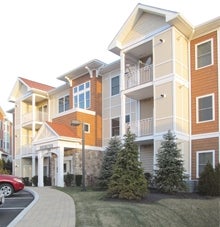When the Gutierrez Co. proposed building 290 apartments in a Marlborough neighborhood made up mostly of single-family homes, many neighborhood residents were not pleased.
Matt Elder, the city councilor from the ward where the project was planned, helped lead the fight against the development this fall. He said his neighbors came out strongly against it because of concerns about traffic, overtaxing of city services and, especially, the addition of children to the schools.
Elder said he felt it was important for the project not to “be upside-down tax-wise,” leaving the city paying more for additional school resources than the project would contribute in taxes.
Under the pressure, Gutierrez pulled its permit application.
“We understand the community’s concern,” said Scott Wiess, managing director of commercial development for the Burlington-based developer.
Wiess said the firm will work with the city and neighborhood residents and plans to submit a new application for development of the plot.
Responding To Demand
The arguments Gutierrez faced are not new to anyone who has ever tried to build a residential development in Massachusetts. People who already live in a neighborhood almost always resist anything that would make the local population any denser, and apartment projects are often particularly controversial. Yet, with vacancy rates for apartments having dropped precipitously in recent years, a number of developers see a big enough market for high-end rentals that they’re willing to try to push them through.
There’s no doubt today’s rental housing market is unusual. Tracking firm Reis Inc. put the vacancy rate for Worcester apartments at 3.8 percent in the third quarter of 2011, down from 6 percent four years ago.
Carl Foley, who builds and owns apartment buildings as president of Botany Bay Properties in Worcester, said his company has been in business for 30 years and rents several hundred apartments.
“This is the first time that we have (had) everything full,” he said. “To say that everything is full is a very comfortable feeling.”
Foley said he’s taken all his advertising for the apartments down from Facebook and the Telegram & Gazette, but he still gets several calls a week from people looking to rent.
He said he sees plenty of demand for high-end rental housing from professionals such as educators who may stay in the city for only a short time.
“If they’re here five years or less it’s not prudent for them to buy a home,” he said.
Foley is confident enough about the demand that the development arm of his business, Botany Bay Construction, is building 32 apartments on June Street, expanding an existing housing complex in the area. Guy Webb, executive director of the Builders Association of Central Massachusetts, said a number of developers are trying to put up high-quality apartments in the region. He said they see demand for that kind of housing in young people who are putting off buying homes, as well as “empty nesters” who don’t want to gamble on a house that could lose value.
Webb said most apartment buildings in the area were built in the 1960s or earlier.
“We weren’t building multi-family (dwellings) for a while,” he said. “There was not the kind of demand for rentals that there maybe should have been if we weren’t in a housing boom.”
Zoned Out
Westborough developer Robert Moss said another reason apartment projects haven’t been popular for decades is that local bylaws are stacked against them. He said many suburban towns wrote zoning regulations in the 1970s that suggested a bias against apartments.
“I don’t know of any town that has a multi-family zone, or an apartment zone,” he said. “Essentially they were zoned out when they put the regulations in.”
Moss just finished Madison Place, a 96-unit apartment project in Shrewsbury. He said the only reason that was possible was that it was essentially an extension of an existing housing complex next door.
Moss said other developments he’s working on depend on Chapter 40B, the state law that pressures communities to permit projects that include affordable housing. Communities where 10 percent of the housing stock is already considered affordable — including Marlborough — are exempt from 40B.
Moss is now trying to build a 140-unit apartment project in Southborough and another 120 units in Sudbury, both under 40B. He said the plans in Sudbury have received a particularly large amount of opposition from residents.
“I would call it a contentious permitting process,” he said.
Moss said more local opposition generally means he must spend more money for lawyers and engineers and have extra studies done. That can add up to a process that costs five times more in one town than in another, he said.
Still, even if it works to his disadvantage, Moss said he understands why residents might oppose new apartments. For one thing, people who rent in upscale apartments like the ones he’s building, and like the Gutierrez and Botany Bay projects, are likely to move or buy homes in different communities before too long rather than put down roots and get involved in the community.
“You’re not going to get on the school committee,” he said. “Your kid might join the Boy Scouts, but you’re probably not going to be the leader.”
But Moss said the higher-cost apartments are also less likely than inexpensive ones to have a high concentration of schoolchildren. That’s because people with more money are more likely to transition to home ownership eventually, commonly during the years they have kids.
Meanwhile, Foley said some objections to developments may be overblown. For example, he said, most people who move into Botany Bay apartments come from elsewhere in Worcester and don’t affect traffic or total population numbers much.
And Foley said neighbors don’t just react badly to apartment projects; they often oppose single-family developments too.
“Neighborhoods resist change,” he said.

